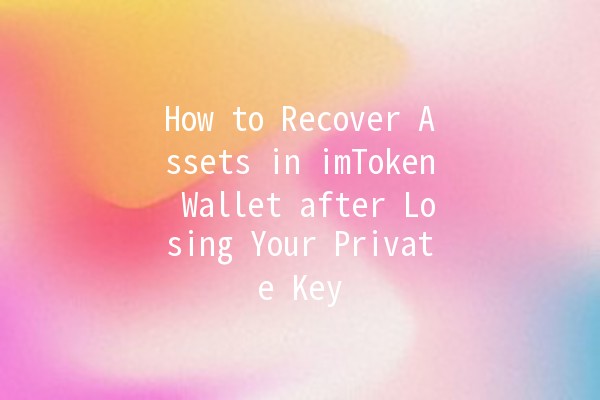Losing access to your private key can be a distressing experience, especially when it comes to securing your digital assets in a cryptocurrency wallet like imToken. This article aims to provide valuable insights and practical methods for recovering your lost assets, along with productivityenhancing tips that can assist you in navigating the process effectively.
Before diving into recovery strategies, it's essential to understand what private keys are and why they are crucial. A private key is essentially a unique string of characters that allows you to access and manage your cryptocurrency funds. Losing your private key can mean losing access to your assets permanently; hence, safeguarding it is critical.

In addition to recovery techniques, adopting effective productivity hacks when managing your digital assets can make a substantial difference. Here are five strategies:
Always keep a secure backup of your private keys. Instead of relying solely on digital storage methods, consider writing down your keys and storing them in a safe place. You can also use encrypted USB drives for added security.
Application Example: If you write your private key on paper, keep it in a safety deposit box or a fireproof safe at home. This way, even if your online storage is compromised, you still have access to your key.
For your accounts associated with your cryptocurrency wallet, 2FA provides an extra layer of security. By requiring a code from your mobile device in addition to your password, unauthorized access is more challenging.
Application Example: Use apps like Google Authenticator or Authy, which generate timebased codes, enhancing your account's security. Always enable this feature on any accounts tied to your crypto assets.
Security practices evolve, and so should your methods. Regularly review and update how you store and manage your private keys.
Application Example: Subscribe to cryptocurrency forums and newsletters to stay informed about the latest scams and security practices, allowing you to adapt your strategies accordingly.
Phishing scams are rampant in the cryptocurrency domain, and understanding how they operate can protect your assets.
Application Example: Familiarize yourself with signs of phishing attempts, such as suspicious emails or websites that look similar to official platforms. Consider sharing this knowledge with friends and family to protect them as well.
Certain tools and software might assist in recovering lost passwords or generating new keys through your recovery seed associated with your wallet.
Application Example: If you set up your imToken wallet with a recovery phrase, write it down securely. If the wallet options include seed recovery, utilize it in tandem with walletspecific recovery tools designed to regenerate access.
In many cases, users who sign up for imToken will have been prompted to create a seed phrase during the setup process. This phrase serves as a backup for accessing your assets and generating new private keys.
Open the imToken app.
Click on ‘Import Wallet’ or ‘Restore Wallet’.
Enter your seed phrase and follow the instructions.
If you can't recover your assets using the seed phrase, reaching out to imToken’s customer support may be a feasible option. Although they may not recover your private key due to their decentralized nature, they can provide detailed advice or troubleshooting steps specific to your issue.
Some services specialize in cryptocurrency recovery, although they should be approached with caution due to the risks involved. Before proceeding with these services, check reviews and ensure their reputation is solid.
While techniques exist to potentially recover your private key, not every asset may be retrievable, especially if the key isn't backed up. It's important to act quickly and understand that the chances of recovery decrease over time.
Lastly, when managing your crypto, maintain a log of all transactions. Tools like CSV files or blockchain explorers can be advantageous for checking previous interactions and confirming asset locations.
Unfortunately, the imToken application does not store your private key, meaning that if you lose it and do not have a backup, recovering it is unlikely. It's crucial to always keep a secure record of your keys or phrases linked with your wallet.
If you possess a partial seed phrase, your chances of recovery diminish significantly. Although some users have reported using brute force recovery methods, these approaches can be risky and timeconsuming without guarantees.
Yes, using thirdparty services carries inherent risks, including potential scams and loss of assets. Ensure you thoroughly research any service and look for credible reviews before entrusting them with sensitive information.
Implementing robust security measures, such as encrypted backups, hardware wallets, and keeping your keys offline, is vital for safeguarding your private keys against unauthorized access.
If your assets have vanished without a trace, consider reviewing your wallet logs or transaction history. It's possible that they were transferred without your knowledge due to a compromised wallet.
Yes, using a combination of secure backup methods, twofactor authentication, and educating yourself about potential scams can significantly reduce the risk of losing your assets in the future. Consistency in practicing these strategies will bolster your cryptocurrency security over time.
, while losing a private key can be overwhelming, understanding the necessary recovery strategies and adopting proactive security measures can significantly safeguard your assets in the future. By implementing the productivity tips and exploring recovery options, users can navigate complexities associated with cryptocurrency management effectively.